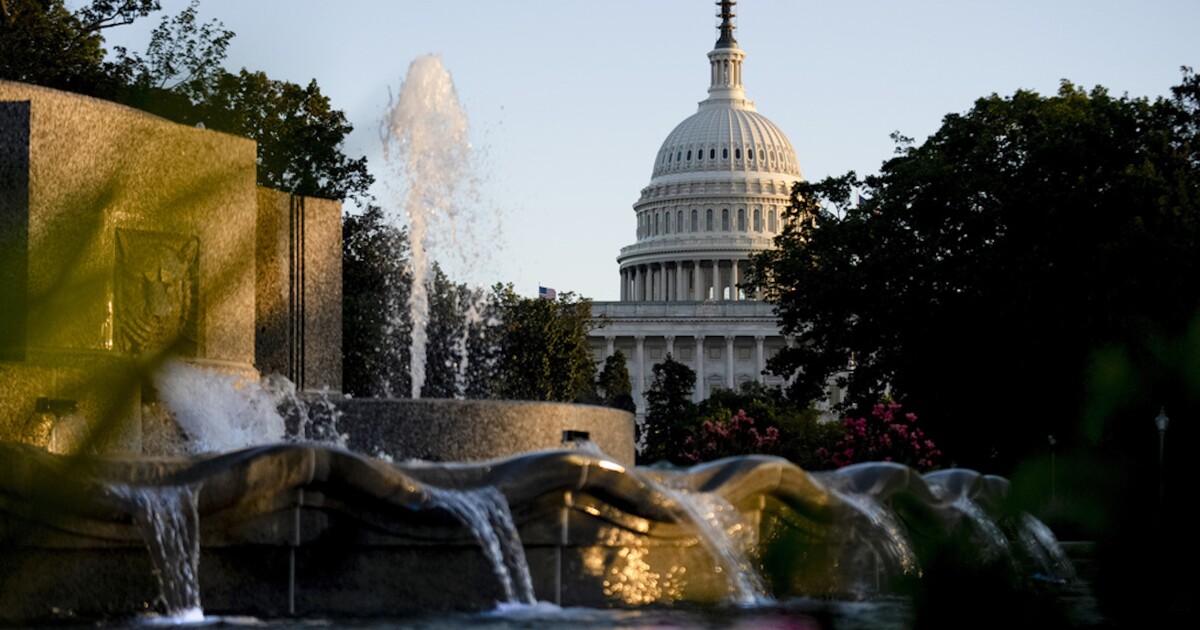

Republicans working to retake control of the United States Senate only need to net wins in two swing races for seats currently held by Democrats to secure the majority.
Senate Minority Leader Mitch McConnell (R-KY) has worked since last year on recruiting the most electable candidates in must-win swing states in hopes of avoiding a repeat of the Republicans’ disappointing performance in the 2022 midterm elections.
SOCIAL SECURITY UPDATE: DIRECT PAYMENT WORTH $914 ARRIVES IN 12 DAYS
The Democrats control the Senate by a 51-49 margin. Republicans only have 10 incumbents up for reelection this cycle, while Democrats have 23.
Of those 23, there are five races that Republicans could flip in 2024.
West Virginia
Sen. Joe Manchin’s (D-WV) decision not to seek reelection was a major victory in McConnell’s prolonged campaign to retake control of the upper chamber.
Manchin is a centrist Democrat in a deep-red state who was widely viewed as the most vulnerable Senate incumbent of the 2024 cycle. Speculation mounted in recent months about the West Virginia senator’s political future as poll after poll indicated that he was trailing his leading GOP challenger, Gov. Jim Justice (R-WV).
If Manchin had run, and if Justice won his primary as polls suggest he will, it would have been the most expensive contest of the cycle for both sides. McConnell and Sen. Steve Daines (R-MT), who heads the National Republican Senatorial Committee this cycle, had listed West Virginia as the top target in their broader strategy to reclaim the Senate majority.
Manchin’s announcement capped off McConnell’s yearlong effort to get the coveted seat back in Republican hands, which included him quietly traveling to West Virginia in late 2022 to encourage Justice to get in the race.
When asked about Justice and securing Senate control in an interview late Thursday, McConnell said: “You can do the math. If we don’t lose any incumbent — and I don’t think we will — he’s No. 50. And one step closer to having a majority. I’ve been involved in a lot of recruiting over the years, some successfully, some not. But I think that’s the best recruiting job I ever did.”
Democrats presently have no path to victory in West Virginia without Manchin in the race, so the party will need to look to other swing states to hold on to its slim Senate majority.
Montana
With Manchin out of the picture, the onus of protecting the Democrats’ Senate majority will fall on a few swing-state incumbents, including Sen. Jon Tester (D-MT).
Tester’s decision to run for a fourth term was a major win for Democrats, giving the party a fighting chance in a state former President Donald Trump carried by over 16 points in 2020. Senate GOP leadership views the seat as within their reach given how red Montana is but worries a crowded primary contest would weaken their candidate in the general election.
In Montana, Daines, Gov. Greg Gianforte (R-MT), and Rep. Ryan Zinke (R-MT) have coalesced around former Navy SEAL Tim Sheehy’s candidacy while openly dissuading Rep. Matt Rosendale (R-MT) from throwing his hat in the ring to prevent a contentious primary.
Rosendale, a member of the conservative House Freedom Caucus, had the support of the Club for Growth in his unsuccessful 2018 bid against Tester. Club for Growth President David McIntosh had said earlier this year that the club would likely support his campaign for a 2024 rematch, though he walked that back after Sheehy launched his bid.
Despite Sheehy’s establishment support, all signs point to Rosendale launching a Senate bid. He’s been appearing at events in Montana’s 1st Congressional District, a sign of his statewide ambitions, and has reportedly hired a campaign fundraiser.
Rosendale is also working to secure coveted GOP endorsements, locking down the support of Montana’s top Republican legislators last week. State Senate President Jason Ellsworth and state House Speaker Matt Regier announced last Thursday that they and nearly 40 others in the state legislature were backing Rosendale despite him not being in the race yet.
The party establishment has said Rosendale’s 2018 loss to Tester proves he cannot win statewide. Tester is unlikely to say if he’d prefer to face Sheehy or Rosendale, whom he demonized as “Maryland Matt,” a real estate developer from the Old Line State who falsely claimed to be a rancher during their 2018 contest.
Ohio
Senate Republican leaders have been wading into Montana, Pennsylvania, and West Virginia’s 2024 GOP primaries in a shift from their 2022 strategy. In Ohio, however, the party’s Senate campaign arm is staying out of the growing primary field of Republicans looking to challenge incumbent Sen. Sherrod Brown’s (D-OH) bid for a fourth term.
Brown’s reputation as an unabashed progressive in an increasingly red state has made him a prime target of Senate Republicans as they look to reclaim control of the upper chamber. Despite benefiting from the power of incumbency, strong name recognition, and high approval ratings, Brown’s 2024 race will be the highest-profile fight of his career.
He has three potential challengers fighting for the GOP nomination, all of whom say they’d welcome the chance to take on a Democrat in a state Trump won by 8% in 2020. Senate GOP leadership has largely stayed out of the primary contest because of the quality of candidates, though the eventual nominee will still face an uphill climb to take Brown’s seat.
Brown has recently polled ahead of all three of his Republican challengers: Ohio Secretary of State Frank LaRose, state Sen. Matt Dolan, and businessman Bernie Moreno. Depending on the candidate matchup and the polls, however, the results have sometimes been within the margin of error.
Pennsylvania
Pennsylvania Republicans and Democrats are gearing up for what is expected to be a bruising and costly battle for Sen. Bob Casey’s (D-PA) seat next year.
The contest for Casey’s seat is expected to be one of the most competitive and expensive of the 2024 cycle, especially given that the race is critical to both sides’ paths to the Senate majority. Pollsters say Casey, the son of former Pennsylvania Gov. Bob Casey Sr. and the longest-serving Democratic senator in Pennsylvania history, is the slight favorite, with his candidacy being boosted by the power of incumbency and strong name recognition.
Despite those strengths, Republicans argue Casey has vulnerabilities and has never had to run in an off-year for his party. The Pennsylvania senator has long cast himself as a centrist Democrat, though state Republicans say he has shifted left in recent years, as evidenced by his support for most of President Joe Biden’s legislative agenda.
As part of their efforts to block him from a fourth term, Republicans recruited former Bridgewater executive David McCormick, who lost the 2022 GOP Senate primary for the vacant seat eventually won by Sen. John Fetterman (D-PA), into the race.
While there is broad recognition that Casey is still formidable, Republicans believe McCormick, a West Point graduate who served in the Bush administration, is the best candidate to take him on. Whether McCormick can land the plane in the general election remains to be seen, but the Republican’s leading state allies acknowledge victory is no guarantee.
Arizona
Sen. Kyrsten Sinema (I-AZ) has yet to launch her 2024 reelection campaign despite continuing to fundraise. The Democrat-turned-independent is remaining mum on her plans as a potential three-way race takes shape.
Despite her enormous influence as one of the most coveted swing votes in a closely split Senate, Sinema’s low approval rating in Arizona and public breakup with the Democratic Party have made her the most vulnerable incumbent up for reelection in the 2024 election cycle.
She and Manchin became foes within the party for their refusal to support eliminating the 60-vote filibuster threshold as the rest of the Senate Democratic Conference got on board, facing an intense, very public pressure campaign to shift their stance on the issue as Biden’s agenda stalled. Sinema, in particular, was turned into a boogeyman among Democrats for her refusal to defend her position publicly as frequently as Manchin, who maintains a rigorous press schedule.
Should she decide to seek a second term, Sinema’s race will put her theory that most voters have also spurned their party identity to the test. It is not clear yet, though, if she can build enough of a centrist coalition to win statewide.
CLICK HERE TO READ MORE FROM THE WASHINGTON EXAMINER
Rep. Ruben Gallego (D-AZ), who emerged as a prominent Sinema critic as she began bucking her party under President Joe Biden, launched a bid to unseat her in January. Gallego is expected to easily win the nomination with Sinema not running in the Democratic primary.
Republican Kari Lake, the party’s 2022 gubernatorial candidate who still refuses to concede her loss to Gov. Katie Hobbs (D-AZ), launched her bid for the GOP nomination in October. She has met with NRSC leadership despite her controversial reputation, as Republicans try to coalesce around a single candidate in hopes of securing a victory in a complicated three-way race.




